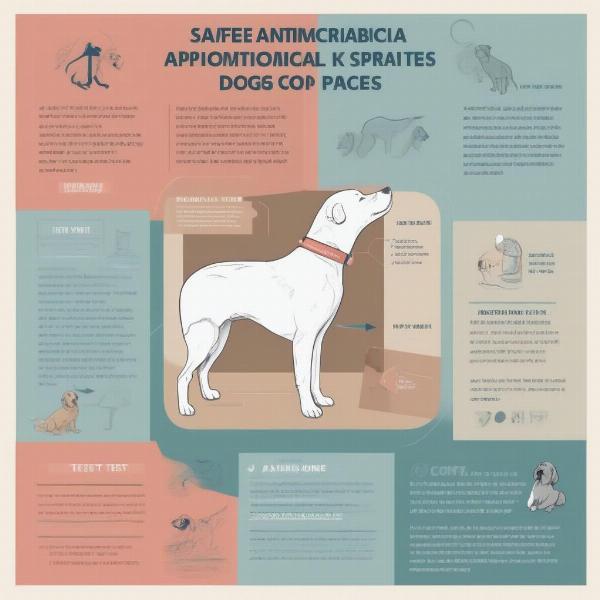Antimicrobial sprays for dogs are becoming increasingly popular as a way to maintain hygiene and prevent infections. But with so many products on the market, choosing the right one can be challenging. This guide provides a comprehensive overview of antimicrobial sprays for dogs, covering their benefits, uses, potential risks, and how to choose the best spray for your furry friend.
Understanding Antimicrobial Sprays
Antimicrobial sprays work by killing or inhibiting the growth of microorganisms like bacteria, fungi, and viruses. They can be useful for a variety of purposes, from disinfecting wounds to deodorizing pet bedding. However, not all antimicrobial sprays are created equal. Some contain harsh chemicals that can be harmful to dogs, while others are specifically formulated for use on animals. Understanding the different types of antimicrobial sprays and their ingredients is crucial for making informed decisions about your dog’s health.
Benefits of Using Antimicrobial Sprays for Dogs
Antimicrobial sprays can offer a range of benefits for dogs, including:
- Wound care: They can help clean and disinfect minor wounds, preventing infection.
- Hot spot treatment: Antimicrobial sprays can soothe and heal hot spots, a common skin irritation in dogs.
- Odor control: They can eliminate unpleasant odors caused by bacteria and fungi.
- Environmental disinfection: Antimicrobial sprays can be used to clean and disinfect kennels, bedding, and other areas where dogs spend time.
- Post-surgery care: They can aid in preventing surgical site infections.
Choosing the Right Antimicrobial Spray
When choosing an antimicrobial spray for your dog, consider the following factors:
- Ingredients: Opt for sprays with natural ingredients and avoid those containing harsh chemicals like bleach or ammonia. Look for ingredients like chlorhexidine, benzethonium chloride, or essential oils known for their antimicrobial properties. benzethonium chloride dogs
- Purpose: Choose a spray specifically formulated for the intended purpose, whether it’s for wound care, odor control, or environmental disinfection.
- Dog’s age and health: Consider your dog’s age, health conditions, and any allergies they may have. Puppies and senior dogs may require gentler formulations.
- Veterinarian recommendation: Consult your veterinarian for recommendations on the best antimicrobial spray for your dog’s specific needs.
How to Use Antimicrobial Sprays Safely
Always follow the manufacturer’s instructions when using antimicrobial sprays on your dog. Here are some general guidelines:
- Test on a small area: Before applying the spray to a larger area, test it on a small patch of your dog’s skin to check for any adverse reactions.
- Avoid contact with eyes and mouth: Be careful not to spray the product near your dog’s eyes or mouth.
- Ventilate the area: Use the spray in a well-ventilated area to prevent inhalation of fumes.
- Supervise your dog: After applying the spray, monitor your dog to ensure they don’t lick or ingest the product. chlorhexidine gluconate for dogs
Potential Risks of Antimicrobial Sprays
While antimicrobial sprays can be beneficial, it’s important to be aware of potential risks:
- Skin irritation: Some dogs may be sensitive to certain ingredients and develop skin irritation.
- Ingestion: Ingesting antimicrobial sprays can cause gastrointestinal upset.
- Respiratory problems: Inhaling the fumes from some sprays can cause respiratory problems. can dogs pee on artificial turf
 Using Antimicrobial Sprays Safely on Dogs
Using Antimicrobial Sprays Safely on Dogs
Conclusion
Antimicrobial sprays can be a valuable tool for maintaining your dog’s hygiene and preventing infections. By carefully choosing the right product and using it safely, you can help keep your furry friend healthy and comfortable. Remember to consult your veterinarian for personalized advice and always follow the manufacturer’s instructions.
FAQ
- What is the best antimicrobial spray for dog wounds? Consult your vet for the most appropriate spray. Chlorhexidine solutions are often recommended.
- Can I use human antimicrobial spray on my dog? No, it’s best to use products specifically formulated for dogs.
- How often can I use antimicrobial spray on my dog? Follow the manufacturer’s instructions or your veterinarian’s advice. grass mat for dogs
- Are antimicrobial sprays safe for puppies? Consult your veterinarian for recommendations for puppies.
- What should I do if my dog ingests antimicrobial spray? Contact your veterinarian or a pet poison control center immediately. chlorhex for dogs
- Can I use antimicrobial sprays to prevent fleas and ticks? No, antimicrobial sprays do not kill fleas and ticks. Use a dedicated flea and tick preventative.
- Can antimicrobial sprays be used on dog toys? Yes, many antimicrobial sprays can be used to disinfect dog toys.
ILM Dog is a leading online resource dedicated to providing expert advice on all aspects of dog care, including breed selection, health, training, nutrition, grooming, and product recommendations. We offer valuable insights, practical tips, and up-to-date information to help dog owners worldwide provide the best possible care for their furry companions. For expert guidance on choosing the right products for your dog, including antimicrobial sprays, contact us at [email protected] or +44 20-3965-8624. Visit ILM Dog for more information.